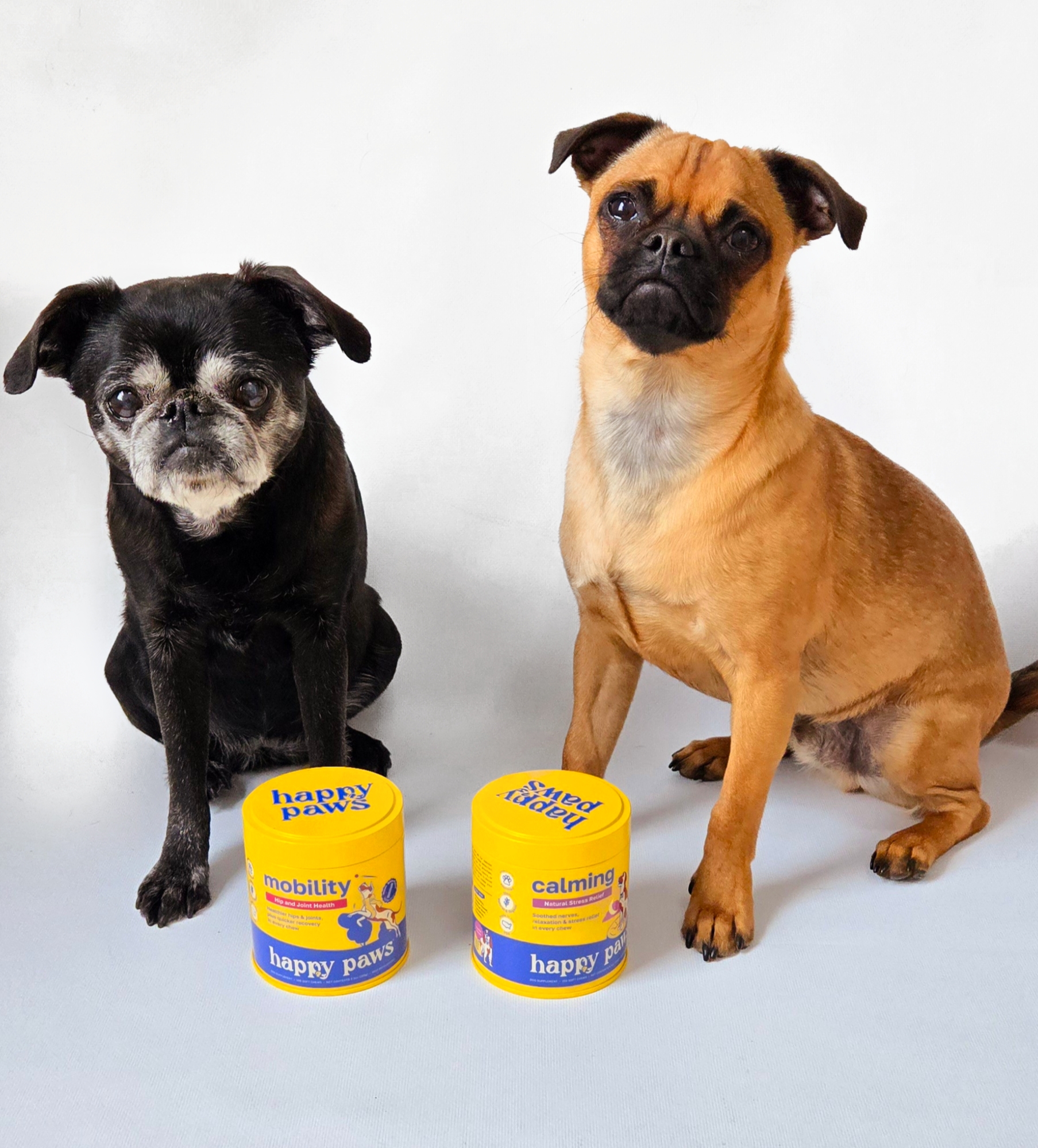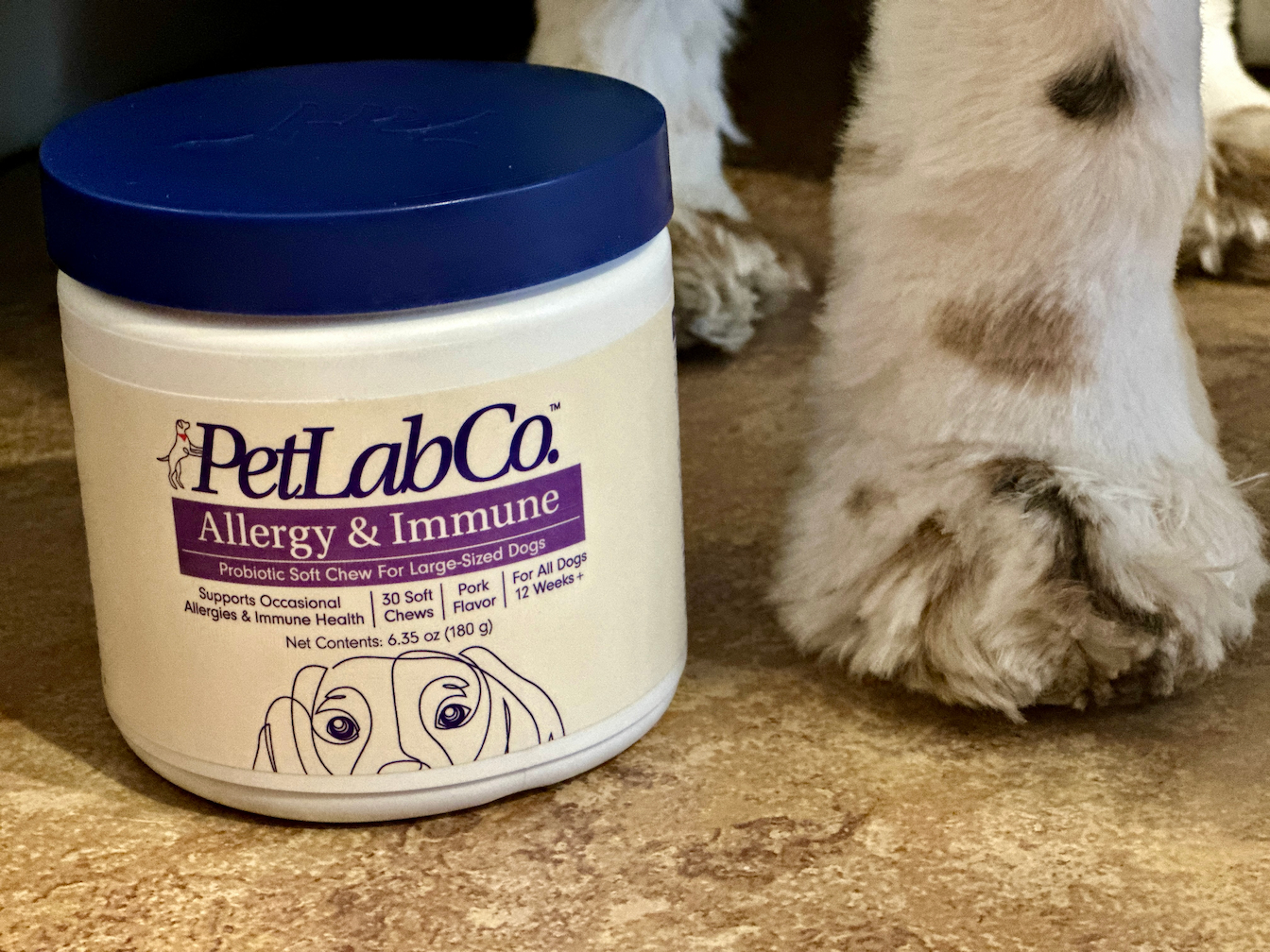Arnica for Dogs: Benefits and Products to Consider
by Cheryl Lock
Reviewed by Catherine Barnette, DVM. Updated on March 11, 2024

When an animal is suffering, pet parents will search high and low for solutions that might help alleviate the issue. And arnica for dogs sometimes pops up as a homeopathic option for pain relief.
However, it’s important to do some research to figure out if this flowering herb is safe and what the potential side effects are.
Whether arnica is already on your radar, or you’re simply interested in learning more, here’s what you should know about arnica for dogs.
What is Arnica?

Arnica—or Arnica montana—is sometimes referred to as Leopard’s Bane. It’s a flowering herb that grows in Canada, the northern U.S., central Europe, and Siberia and has been used as an herbal remedy since the 1500s.
Arnica is sometimes infused into topical creams, salves, and tinctures to relieve osteoarthritis symptoms in humans or to help heal sprains or bruises. It’s sometimes used as a homeopathic remedy for certain ailments in dogs.
Our Picks
All featured products are chosen at the discretion of the Vetstreet editorial team and do not reflect a direct endorsement by the author. However, Vetstreet may make a small affiliate commission if you click through and make a purchase.
- PetAlive ComfyPet Homeopathic Medicine for Pain
- Boiron Arnica Montana Homeopathy Pellets
- NHV Heal Care Ointment
- HomeoPet HP Healing Cream
Arnica Products for Dogs
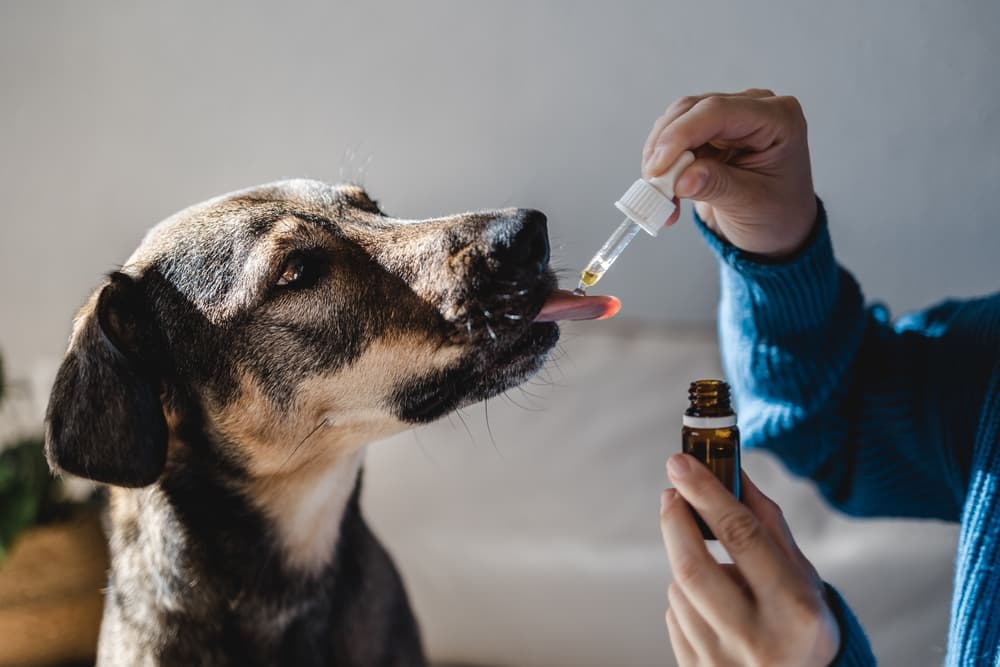
If you’re in the market for an arnica product for your dog, the following have received good reviews—though they have not been endorsed by a veterinarian.
Here are some options to discuss with your own veterinarian for potential use:
PetAlive ComfyPet Homeopathic Medicine for Pain
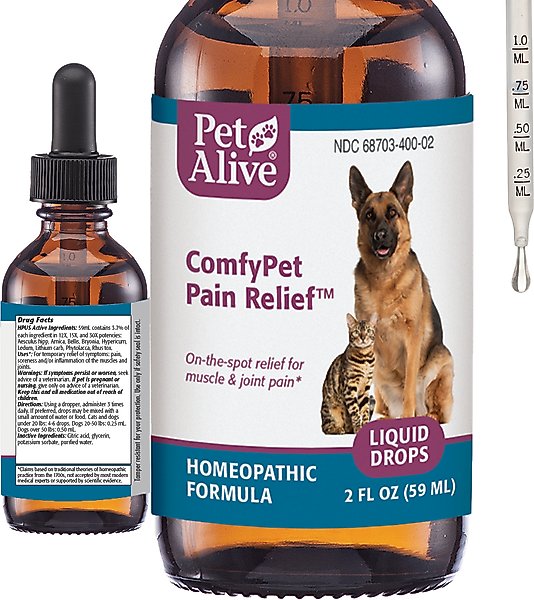
This remedy—meant to help temporarily reduce muscle and joint discomfort—is gentle and easy to use, with a 4.8 out of 5-star rating.
Highlights
- Easy-to-administer dropper allows you to put small doses directly into your pet’s water, food, or mouth.
- All ingredients are 100% natural.
- The product is made in an FDA-registered, cGMP compliant facility.
Boiron Arnica Montana Homeopathy Pellets

While these arnica pellets are intended for human use, they are often used by homeopathic veterinarians as a safe and effective, low-dose option for pets too. While these pellets are common in homeopathic vet medicine, it’s encouraged to speak with your veterinarian before administering them to your dog.
Highlights
- These pellets dissolve quickly in the mouth.
- 30C dosage is safe for pets.
- Highly diluted formula means low risk of side effects
NHV Heal Care Ointment
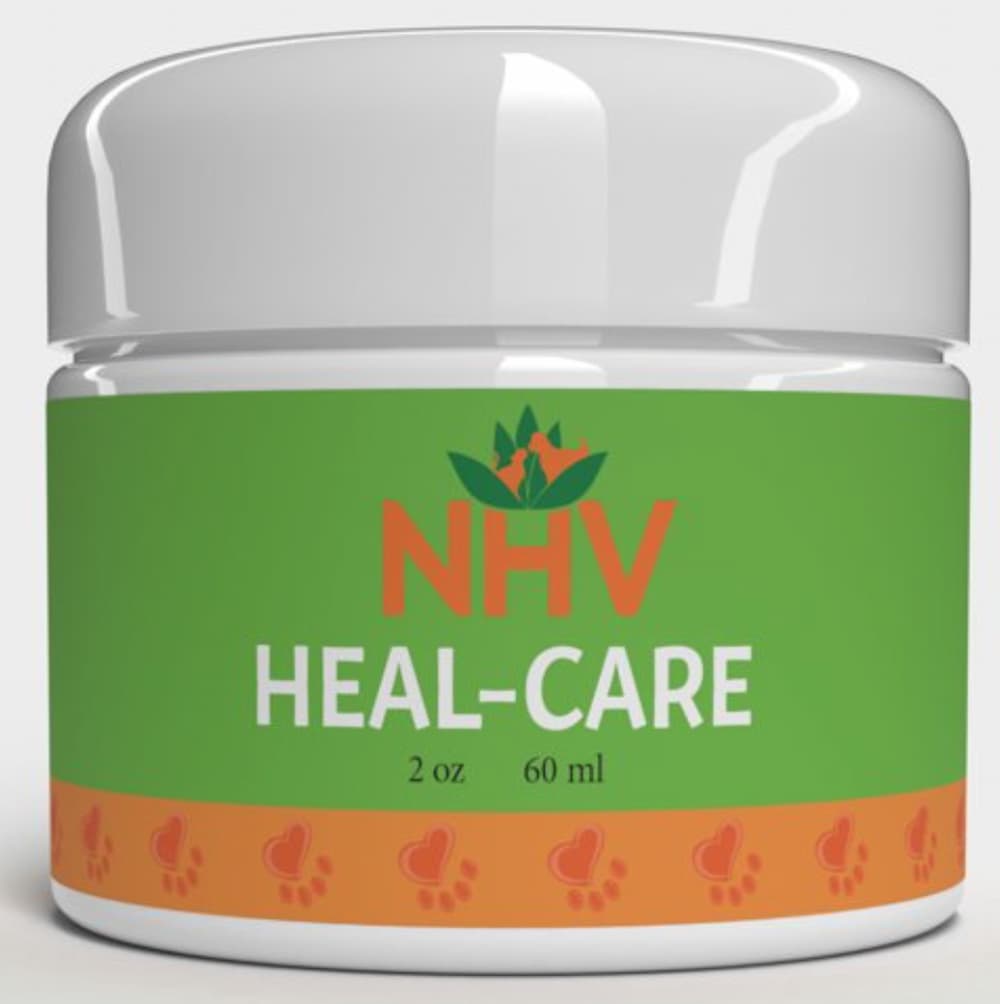
This topical ointment can be used for bruises, joint aches, and cracked paw pads on dogs. It’s all natural and safe when licked and can be applied 3-4 times per day as needed. The ingredient list contains a blend of arnica, St. John’s wort, olive oil, and beeswax.
Highlights
- All natural ingredients and safe if ingested or licked.
- Easy to apply topically to dogs.
- Not greasy, but it does take a few minutes to absorb.
HomeoPet HP Healing Cream
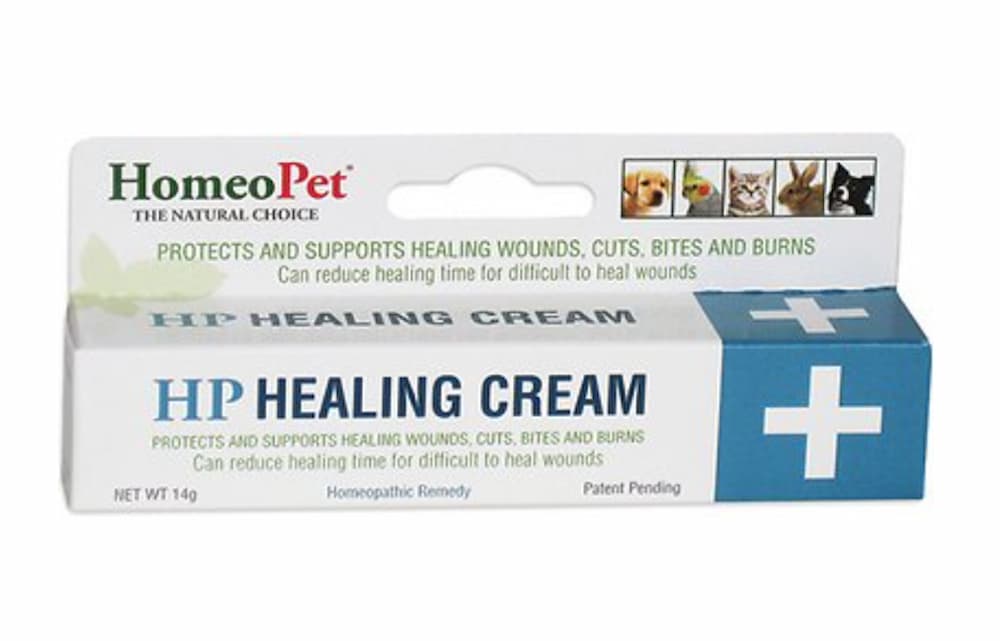
This steroid-free cream was developed to help ease pain and promote recovery related to wounds, bites, and burns to help reduce swelling, pain, shock, and infection.
Highlights:
- The chemical- and steroid-free formula uses all natural herbs and essential oils
- Easy to use mist allows quick administration
- The product is made in the USA and registered with the FDA
How Does Arnica for Dogs Work?

Properly diluted and prepared homeopathic arnica remedies are used to help alleviate pain in dogs. They can also help to heal sprains and bruises. Homeopathic remedies are not the same as using the arnica plant, which can be toxic if ingested.
“The arnica herb itself is poisonous,” says Dr. Jerry Klein, AKC’s Chief Veterinary Officer. “But in commercially prepared, diluted doses, arnica is used in some homeopathic circles to reduce swelling and inflammation by increasing blood flow to the affected tissue and draining fluid away from it. It does this by encouraging capillaries to dilate, and by increasing lymphatic drainage.”
Arnica tablets and pellets come in a variety of potencies from 6C (being the least potent) to 30C, and 200C (the most potent). Your holistic veterinarian can advise you on a suitable potency depending on what your pet is experiencing. Most topical preparations can be used 2-3 times a day to help with inflammation and provide additional pain relief for pets.
Arnica is used commonly by holistic veterinarians for strains, sprains, muscle aches, and other injuries where there is bruising. Animals that need arnica are usually in great pain following an injury. This remedy makes a very useful one to have in your pet’s first aid kit.
Although the herb has been used in homeopathy and western herbal practices for years to treat both humans and animals, there are very few scientific studies proving the effectiveness of arnica as a treatment for any medical condition, says Dr. Klein. “When arnica is used, it’s usually by homeopathic veterinarians in conjunction with conventional medical treatments, such as antibiotics and anti-inflammatories,” he says.
Some anecdotal evidence has suggested that when used post-surgery, arnica may have anti-inflammatory properties, helping to enhance the effects of veterinary prescribed anti-inflammatory medications. “It’s important to remember that arnica is best used as a supplement to conventional veterinary prescribed medications,” Dr. Klein says. “Never treat your pet without first consulting with your veterinarian.”
How to Use Arnica for Dogs

Arnica can be found in a variety of forms, including topical creams, gels, tablets, pellets, oils, and as a tincture. Each is useful for different ailments and levels of pain, and you can combine different forms of arnica to achieve the best results.
Although arnica can be safe for dogs in the correct form and dose, “the type of arnica that is most suitable for your dog should always be decided by your veterinarian,” says Dr. Klein, who adds that it’s essential to discuss your dog’s symptoms with your veterinarian first, before beginning any treatment.
Because certain topical arnica products can be toxic when ingested, make sure that your dog doesn’t lick it off after it’s applied. If you do use topical arnica, Dr. Klein suggests keeping a close eye on your dog immediately afterwards, and applying the medicine at mealtime or before a walk to distract them from licking it off. If you think your dog has ingested arnica, contact your veterinarian.
Dr. Klein also suggests avoiding the use of arnica on broken skin or open wounds, as it can impair healing and cause unwanted bleeding. Since it also increases blood flow and circulation, you should never give it to a dog taking any medications that thin the blood, because it could cause excessive bleeding.
Avoid giving it to your dog leading up to a surgery, as well, because it could cause unwanted and excessive bleeding, putting your pet at additional risk. “Always mention all herbs and supplements that you are giving to your dog, especially prior to any medical or surgical procedures, or if your dog has underlying medical conditions,” says Dr. Klein.
Arnica Side Effects in Dogs

Like any other medicine or supplement, arnica can have potential side effects for dogs when used as a topical treatment or if ingested.
Side effects of topical arnica in dogs may include:
- Dryness of the skin
- Itching
- A rash
- Pain
If the arnica plant is accidentally ingested, side effects may include:
- Vomiting
- Shortness of breath
- High blood pressure
- Collapse
If ingested in high amounts, the arnica can be deadly, so it’s important to follow dosing guidelines.
Where to Buy Arnica
Arnica can be purchased over the counter from most health stores, from homeopathic pharmacies, or online. “Arnica is not a regulated medicine, so take care when shopping,” says Dr. Klein. “There are many knock-off versions out there that could either harm your pet or simply not work.”


